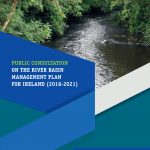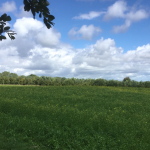The overarching aim of the Water Framework Directive is to…
Minister Murphy launches River Basin Management Plan 2018-2021
- Plan to result in the protection and improvement of water quality in approximately 726 water bodies in Ireland
- €1.7 billion investment in urban waste water treatment infrastructure by 2021
- New Agricultural Sustainability Support and Advisory Programme to promote best agricultural practice regarding water quality in 190 targeted areas
The Minister for Housing, Planning and Local Government, Eoghan Murphy T.D., launched the River Basin Management Plan (RBMP) for Ireland 2018-2021 on April 17th 2018 .
The Plan is available now on the Department of Planning, Housing and Local Government’s website.
The Plan outlines the measures the State and other sectors will take to improve water quality in Ireland’s groundwater, rivers, lakes, estuarine and coastal waters over the next four years. The Government aims to protect and improve water quality in 726 of Ireland’s 4,829 water bodies over the next four years. The Plan is in fulfillment of requirements under the Water Framework Directive (WFD).
Speaking after launching the Plan at an event for stakeholders, Minister Murphy said:
“Today is a seminal day for water quality in Ireland. Environmental water quality is vital to clean water sources, clean food production, good quality of life and protecting public health and the environment. This Plan represents the most coordinated and ambitious roadmap for improving water quality that Ireland has ever produced. All involved in influencing and delivering it should be proud today.”
Amongst the Plan’s main commitments are:
- Planned investment by Irish Water of approximately €1.7 billion in waste water infrastructure and projects in 255 urban areas by the end of 2021 – protecting both the environment and public health.
- Deployment of 43 specialist local authority investigative assessment personnel, who will carry out scientific assessments of water bodies and drive the implementation of measures at a local level.
- A new Agricultural Sustainability Support and Advisory Programme, a partnership between the State and the dairy industry, consisting of 30 Sustainability Advisers. Advisers will engage collaboratively with farmers to promote agricultural best practice across the dairy sector in 190 targeted ‘areas for action’. The programme will provide advice and support to farmers, facilitating knowledge transfer and encouraging behavioural change as the cornerstone of the drive towards better farming practice and water quality.
The initiative will complement agri-environment measures under the Rural Development Programme, the Nitrates Action Programme and the National Dairy Sustainability Forum. These initiatives will help enhance Ireland’s reputation as a global leader in high-quality food production.
- A ‘Blue Dot Catchments Programme’, a programme to create awareness, promote best practice and focus efforts and resources to protect our highest quality waters, vital to our environment and our tourism and recreation sectors.
- Greater focus on protecting drinking water sources in over 700 public and private drinking water supplies and €73 million per year in investment by Irish Water to reduce leakage, saving 61 million m3 of water each year (similar to total non-domestic water demand in the Greater Dublin Area every year). This has the effect of reducing the leakage rate of drinking water produced from 45% to 38%.
- Extension of the local authority-led Domestic Waste Water Treatment Systems grant scheme: the revised scheme will assist with the cost of septic tank remediation in ‘high status’ (excellent quality) water areas and in areas identified for priority action. The scheme will be promoted in these sensitive water areas to the benefit of water quality. Details will be finalised in the coming months.
- A Community Water Development Fund to support community initiatives to improve water quality. The fund will be administered by the newly-established Local Authority Waters and Communities Office (LAWCO). LAWCO consists of Community Water Officers located across the country who are already working with the public, communities and stakeholders on measures to improve local water quality.
On the expected outcomes arising from the Plan, Minister Murphy said implementation will result in social, environmental and economic benefits.
“By implementing this Plan, communities will benefit from improved waste water treatment, stronger protection of drinking water sources and cleaner waters for recreation. Environmentally, water quality will improve and be protected in 726 water bodies, with full recovery in water quality status class expected in 152 water bodies.
Economically, water-intensive sectors such as the agri-food, tourism and hospitality sectors – which collectively sustain approximately 400,000 jobs, many in rural Ireland – will also benefit from greater protection of water supply sources and cleaner natural waters.
Concluding, the Minister said:
“This Plan is underpinned by strong implementation structures and a commitment to meaningful community and civic participation. I want to thank all those who have contributed to the Plan, including the many who attended public meetings and provided submissions during last year’s public consultation. Today we have a plan. Tomorrow we will continue to make the Plan’s vision a reality and protect this most precious natural resource for current and future generations.”







